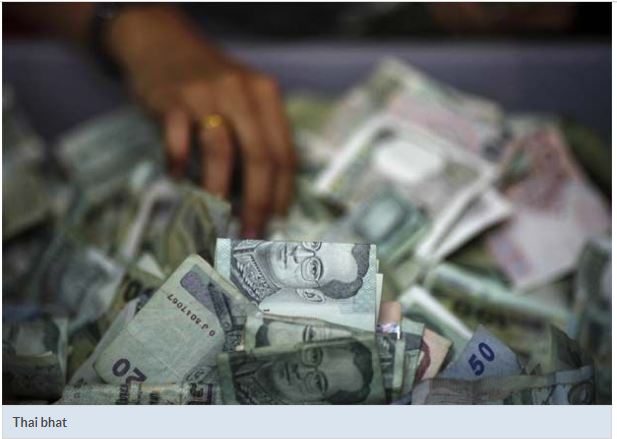Thai baht takes a hit from tourism wipeout
BANGKOK: A perfect storm is engulfing Thailand’s baht and the one group of people who can save it are stuck in lockdown, thousands of kilometers from the arrival lounges of Bangkok, Phuket and Chiang Mai.
A current-account deficit, resurgent US dollar and the seasonal repatriation of dividends by Japanese investors have all helped made the baht the worst-performing currency for Asia’s emerging markets for March. But it’s the bleak outlook for tourism that’s underlying the weakness, sending the US dollar-baht to nearly a six-month high and ever closer to a test of its four-year downtrend.
“The real stimulant for the economy would be the return of international tourists and it’s something that will largely be missing in action this year, ” said Prakash Sakpal, a senior economist at ING Groep NV in Singapore. “I would be surprised if the Thai baht sees the previous support it enjoyed from external surpluses anytime soon.”
The more than year-long pandemic has helped erode a key attraction for the baht – the Thai current-account surplus – which has flipped to a deficit for four straight months after six years in the green. Tourism receipts contributed more than 62% of the surplus in 2019, according to ING.
As Europe – the second-biggest source of tourists to Thailand – is grappling with another wave of infections, visitor numbers are unlikely to rebound soon. The Bank of Thailand lowered its estimate for arrivals this year to 3 million from December’s estimate of 5.5 million – less than a 10th of the 39.9 million tourists who visited in 2019.
The shortfall in the current account has had a knock-on effect, leaving the baht vulnerable to outflows from rising US yields and the seasonal repatriation of dividends by Japanese companies, according to Kobsidthi Silpachai, head of capital market research at Kasikornbank Pcl in Bangkok. They amounted to US$3.5bil (RM14.55bil) in the first quarter of last year, he said.
The propensity to import gold by Thais when prices are going down has also weighed on the baht, he added.
The Thai currency has dropped about 3% in March, taking losses for the year to around 4.5%.
Still, the baht’s decline is welcome news for the central bank, which had been trying to rein in appreciation of the currency last year.
“Policymakers should take comfort in accelerated baht depreciation – something they strived hard for quite a long time through several market measures that never came their way – as supportive for exports and tourism recovery, ” said ING’s Sakpal.
Commerzbank AG forecasts the baht could slide to 32 by year-end, well above the median year-end estimate of 30 per US dollar in a Bloomberg survey of analysts.
“We’re looking for a muted, bumpy recovery for the economy given the pandemic, ” said Charlie Lay, a currency analyst in Singapore. “Global travel will only come back gradually, which will hamper the recovery in tourism.”
Bloomberg earlier reported that Thailand expects about two million foreign tourists, mostly Chinese and Europeans, to visit Phuket this year after the nation’s most popular resort island reopens to vaccinated visitors from July 1.
The news agency quoting Vichit Prakobgosol, vice-president of the Tourism Council of Thailand, reported that the holidaymakers may generate about 105 billion baht (US$3.4bil) in revenue in the second half. It will be the first time in more than a year that the island allows visitors without the mandatory two-week quarantine. — Bloomberg


 Thailand
Thailand





